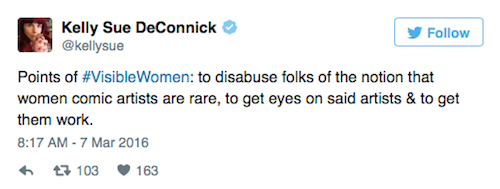The digital world has opened us all up to a lot of professional advantages, in terms of showcasing skills and networking with other creators. We now have personal websites and portfolios and LinkedIn accounts that may or may not be frequently checked. However, time and time again one of the most informal sites ends up being the most useful for creators: Twitter. It’s already well-known that professionally branding yourself on Twitter can be helpful, but 2016 saw a new trend emerging in how Twitter can be used to uplift minority creators.
On March 6, 2016, Kelly Sue DeConnick, one of Portland’s local comic book writers, started #VisibleWomen. DeConnick offered to spotlight any women comic book artists who tweeted her a link to their work using #VisibleWomen. This seemingly impromptu campaign came only a couple of months after the Angoulême International Comics Festival was widely criticized—and even boycotted—for nominating thirty male artists and absolutely no women for their most distinguished award. In her original tweet, DeConnick explained that the purpose of the hashtag was to “disabuse folks of the notion that women comic artists are rare, to get eyes on said artists & to get them work.”
When I first saw her call to action, I wasn’t sure how many retweets I would see that day. However, I checked my Twitter app a couple hours later and found that my feed was being dominated by the portfolio and webcomic links of countless women creators (a storify of the March 6 and 7 tweets can be found here). Due to the success of this first run, DeConnick brought back #VisibleWomen again in early August, this time specifying on the Milkfed event page that nonbinary creators would be welcome to submit their work as well. DeConnick hasn’t revived the hashtag on her personal Twitter account since August, but I think it’s safe to say that her specific message has been made utterly clear.
Despite the fact that I’m not an artist myself, the sense of community and resilience presented through this simple hashtag was pretty inspiring. Unfortunately, I haven’t seen this style of awareness campaign pop up on any other well-known creator’s social media. However, this lack of uptake has made me begin to question whether or not it’s even ethical to expect this type of action from creators. Shouldn’t the responsibility for breaking false notions about minority creators fall on the publishing companies? Aren’t publishing companies perfectly capable of taking up the hashtag?
Realistically, I know this can’t be expected from the Big Two, but there are plenty of smaller, indie comics publishers with significantly large Twitter followings. Many of these companies already support and sign minority creators, so it doesn’t seem like much of a stretch for them to also promote and retweet a community-building hashtag. For now, though, the hashtag is still alive and thriving with creators adding to it nearly every day.

